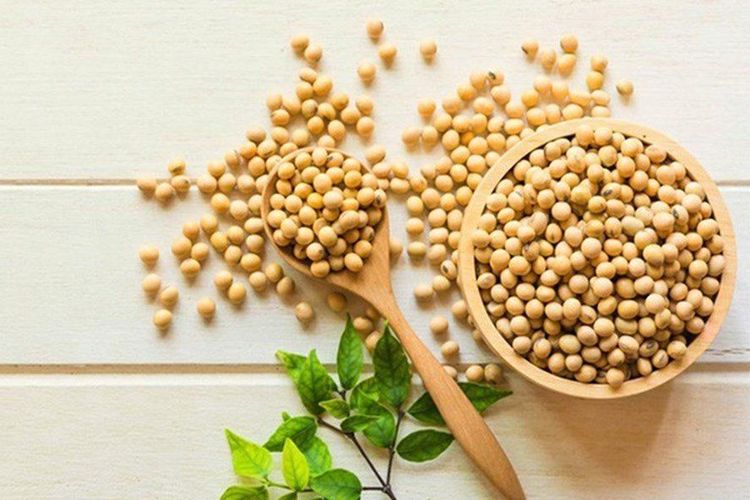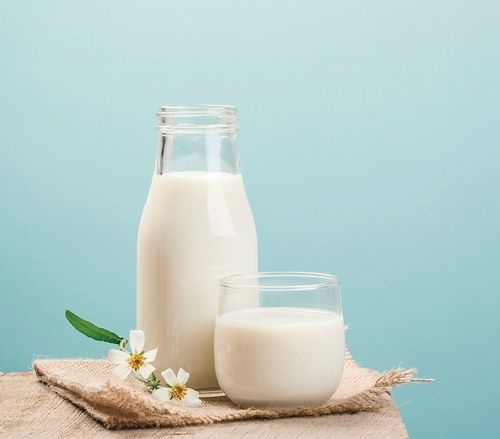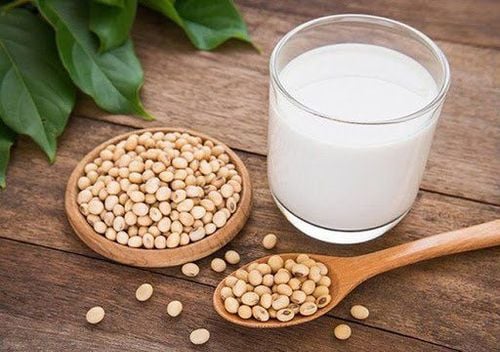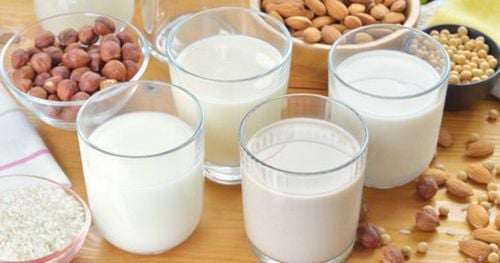This is an automatically translated article.
Plant-based milks are popular alternatives to regular cow's milk, and they can be a great choice for some adults, especially those who are lactose intolerant. But are non-dairy milks like soy milk good for babies and children? And should children drink soy milk? This article will provide information on this issue.
1. What is soy milk?
Soy milk is made from cooked soybeans and contains soy protein, natural or added sugars, and fiber. While the nutritional content can vary between brands, a 114-ml glass of soy milk contains about 40 calories, 3 to 4 grams of protein, 2 grams of fat, and half a gram of sugar. In addition, soy milk also contains minerals such as calcium, iron and potassium.
2. Should babies and children drink soy milk?
Infants under the age of 1 should not drink cow's milk, soy milk or any other plant-based milk and only eat breast milk or formula (with a little water after the baby starts solids).

Trẻ sơ sinh dưới 1 tuổi chỉ nên uống sữa mẹ hoặc sữa công thức
Cow's milk contains too much protein and minerals for an infant's stomach to process and most plant-based milks are not a complete source of the nutrients babies need early on.
Between the ages of 1 and 5, doctors recommend that children drink mainly cow's milk and water. However, fortified soy milk is an acceptable substitute for cow's milk, as it is nutritionally equivalent.
So, if your child drinks soy milk before the age of 5 and after the age of 1, make sure that the child drinks fortified and unsweetened soy milk. Children 1 to 2 years old should drink two to three cups of whole milk per day.
If your child has a health problem such as a milk allergy or lactose intolerance, or if your family does not eat animal products, fortified soy milk is an alternative. suitable for cow's milk.
3. Is soy milk really good for babies and children?
You shouldn't give babies under 1 year old soy milk, unlike soy milk, breast milk and formula contain all the nutrients a baby needs.
After 1 year, babies should eat whole cow's milk, but fortified unsweetened soy milk is an acceptable alternative if your family is vegan or the child has milk sensitivities or problems about other underlying medical conditions.
Work with your pediatrician to determine the best soy milk for your baby. Not only is concern about the nutritional content of soy milk can vary by brand, but experts point out that our bodies may not be able to absorb nutrients from plant-based milk as well. that can happen from cow's milk. So make sure that the type of formula you are choosing for your baby is one of those recommended by your doctor.

Cha mẹ nên trao đổi với bác sĩ nhi khoa để lựa chọn loại sữa đậu nành tốt nhất cho trẻ
4. Is soy milk safe for babies and children?
Infants under 6 months of age should only drink breast milk or formula. After starting complementary foods, children should still only drink a few sips of water between meals but not cow's milk or soy milk.
After 1 year of age, you should only give your baby a small amount of regular, unflavored cow's milk, or if your child is allergic or intolerant to milk (or to a vegan diet) fortified unsweetened soy milk.
Cow's milk is an important source of protein, calcium, potassium and vitamins A, D and B12. But plant-based milks can have a wide variety of nutrients, but with the exception of some fortified soy milk is not an ideal substitute for dairy.
5. The right time for children to drink soy milk
If your child has a milk allergy or intolerance, or you are nursing and feeding your child a vegetarian diet, you can give your child a pediatrician-recommended soy milk supplement starting at when the child is 1 year old.
However, if the child has no health problems or if your family eats animal products, then it is better to avoid plant-based milks until your child is older.
The leading child health organizations in the United States recommend that parents do not substitute plant-based milk for cow's milk in children under 5 years of age, with the exception of fortified soy milk.

Tốt hơn hết nên cho trẻ uống sữa bò cho đến khi con đủ lớn
6. Some nutritional information of soy milk
6.1. Soy and cow's milk for babies and children In addition to some fortified soy milks, experts point out that cow's milk contains more nutrients than plant-based milk. For example, 1 cup of whole milk contains 149 calories, and about 7 to 8 grams of protein compared to 105 calories and 6 grams of protein in soy milk.
Whole milk also contains more fat and sugar. One cup of cow's milk contains 8 grams of fat and 12 grams of sugar; One cup of soy milk contains about 3.5 grams of fat and 9 grams of sugar.
For vitamins and minerals, 1 cup of whole milk contains 276 mg of calcium and 322 mg of potassium, while the same amount of soy milk contains 300 mg of calcium and 298 mg of potassium.
6.2. Soy milk and phytoestrogens Soy milk contains compounds called phytoestrogens, also known as phytoestrogens or isoflavones. Although it has been reported for many years that phytoestrogens may be involved in breast cancer, other studies have shown that isoflavones may protect against diseases such as breast, endometrial, and prostate cancers. paralysis .
As for reports that too much phytoestrogen can affect hormones in children, Pediatrics (Journal of the American Academy of Pediatrics) points out that there is no evidence that soy isoflavones have any any negative effect on the hormones or their development.
In addition to the fact that soy milk contains phytoestrogens (an estrogen-like hormone found in plants such as whole grains, potatoes, dried beans and apples), there is no scientific evidence to date for this. found drinking soy milk harmful to children or adults.
People have been drinking soy milk since the 1960s without any problems. Many brands of soy milk highlight the fact that they contain isoflavones, phytoestrogens that can lower blood cholesterol levels in adults.

Chưa có bằng chứng khoa nào cho thấy uống sữa đậu nành có hại cho trẻ em
7. Should children drink soy milk if they have a milk allergy?
If your child has a milk allergy, which is a bit rare, affecting only about 2 to 3% of babies, or is intolerant to lactose, a sugar found in milk and dairy products, you can give it to your child. added soy milk if younger than 1 year old.
But since plant-based milks like soy milk can vary by brand, it's important to talk to your pediatrician or dietitian to choose the right one for your baby. .
Soy milk and calcium Although some soy milks contain slightly more calcium than cow's milk, they also contain natural compounds called phytates, and can interfere with your ability to absorb calcium. young. If your child is drinking soy milk instead of cow's milk, discuss this with your pediatrician whether you should add other calcium-rich foods like spinach and fortified cereals to your child's diet. are not?
Also, make sure your child's diet includes other calcium-rich (or calcium-fortified) foods as soy milk contains phytates, which are naturally found in whole grain foods, legumes, and legumes. and nuts can reduce the absorption of calcium and other minerals. While the label on a can of fortified soy milk may say that a 228 ml glass contains 200 to 300 mg of calcium, phytates may prevent your child from absorbing all of the amount.
Studies have found that the body absorbs only about 75% of the calcium from soy milk. Therefore, parents can add calcium-rich foods such as: broccoli, kale, tortillas made with lemon, yogurt and cheese in the child's diet. Other options include calcium-fortified juices, cereals, waffles, and breakfast bars.
8. Notes on milk allergy when children use
Milk allergy in babies is extremely rare, but you should know how to spot the signs. Breastfed babies can have an allergic reaction to the milk in their mother's diet, while formula-fed babies react to the milk proteins found in the formula itself.
Some of the symptoms of a milk allergy in babies include frequent spitting up, signs of abdominal pain, vomiting, diarrhea, wheezing, trouble breathing, coughing and itching, watery or swollen eyes. When these signs appear, you should call the pediatrician to promptly handle the child's condition.
For children to be healthy and develop well, it is necessary to have a nutritious diet in terms of quantity and quality balance. If children are not provided with adequate and balanced nutrients, it will lead to diseases of excess or lack of nutrients, which adversely affect the comprehensive development of children in terms of physical, mental and motor skills. Parents should supplement their children with supporting products containing lysine, essential micro-minerals and vitamins such as zinc, chromium, selenium, and B vitamins to help fully meet the nutritional needs of children. At the same time, these essential vitamins also support digestion, enhance nutrient absorption, help improve anorexia, and help children eat well.
Parents can learn more:
Signs of zinc deficiency in children
Micronutrient deficiency and failure to gain weight in children
Please regularly visit Vinmec.com website and update useful information to take care of your child. Take care of the baby and the whole family.
Articles refer to the source: Babycenter.com













